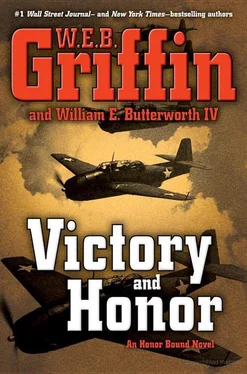Frade considered that, nodded, and said: “Then I guess you’re the man I’m looking for. You can pass this on to Ambassador Giménez. . . . Wait. I just thought of something: How can you be an ambassador to a country that no longer exists? What used to be Germany is now territory held by force of arms by the Allied Powers and under martial law. Can you accredit an ambassador to a military headquarters?”
Nulder’s face showed both that he had not expected the question and that he had no answer to it.
“I really don’t know,” he confessed. “Why don’t we leave such questions to the Foreign Ministry?”
“Okay. But the reason I wanted to see the man in charge—and the reason I’m just now having my breakfast—is that the commanding general of this base sent for me. When I got to his office, he had several officers of the United States Secret Service with him. Are you familiar with the Secret Service?”
“Somewhat,” Nulder said.
“Well, their primary duty is to protect the President. I knew that. But what I remembered just now is that they’re under the secretary of the Treasury.”
“I don’t understand what that means,” Nulder admitted.
“Well, the secretary of the Treasury is a man named Morgenthau. He’s Jewish. He doesn’t like Nazis. He’s heard that some Nazis are going to try to avoid trial for war crimes by escaping to South America. So he’s put the Secret Service on it.”
“I don’t quite follow you,” Nulder said.
“They were subtle, if you know what I mean,” Frade said. “They didn’t come right out and say they suspect the Foreign Ministry of doing anything they shouldn’t, like smuggling Nazis into Argentina, but they did tell me that any diplomats going into occupied Germany could forget diplomatic immunity. Anybody caught trying to help Nazis get out of Germany will find themselves standing in front of a court-martial.”
“I don’t think they can do that,” Nulder said.
“I don’t know if they could or not, Señor Nulder. But that’s what they told me. It was sort of a word to the wise, if you know what I mean.”
Nulder did not reply.
“They also told me the Secret Service has authority on any U.S. base—like this one, and Canoas. Which means, if they wanted to, they could search the airplane and check everybody’s identity.
“What they were saying, without coming right out and saying it, was that we can expect to be searched pretty carefully on our way home.”
After a long moment, Nulder said: “Interesting. Have you any idea when we’ll be taking off?”
“Ten minutes after I finish my breakfast.”
“Well, then, I’ll see you aboard,” Nulder said, offered his hand, and then began walking away.
“Pass that on to Ambassador Whatsisname, will you, Señor Nulder?” Clete called after him.
Nulder acknowledged the call with an impatient wave of his hand, but neither replied nor turned around.
Clete looked at Delgano.
“Gonzo, why do I think I just ruined Señor Nulder’s day? And why doesn’t that bother me?”
“You’re crazy, Cletus, that’s why,” Delgano said.
But Delgano was smiling.
And when Frade looked at Captain Peralta and the chubby flight engineer and saw their smiles, he knew it wasn’t probable they were officers of the BIS—but certain.
Portela Airport Lisbon, Portugal 1850 17 May 1945
The weather had not been good. And there had been no tailwind. There had been turbulence—some of it severe—several times.
Delgano had flown the entire leg with Peralta as his copilot. Frade knew that the smart thing for him to do was take over from Delgano to give him a rest. He also knew—although it wasn’t true—that Delgano would take being relieved as proof that Frade found his piloting wanting. And so would the other SAA pilots and flight engineers.
So he had let him fly.
There was also some electrical disturbance; they didn’t pick up Portela’s Radio Direction Finding signal until thirty-five minutes after the dead-reckoning flight plan said they should. Worse, when they finally heard it, it showed them to be about one hundred miles south of where they should have been.
They had been in no unusual danger. They had a little more than an hour’s fuel remaining when they touched down at Portela Airport in a driving rain.
Still, it had been anything but a pleasant flight, and Delgano’s face showed his fatigue when he looked up at Clete.
“Nice job, Gonzo,” Clete said.
The grateful look Delgano then made told Clete he had made the right decision in not trying to relieve him.
A FOLLOW ME pickup truck led them to the passenger terminal.
It was raining so hard that Clete ordered that they leave the cockpit door closed and exit the aircraft by the passenger door, up to which had been rolled a covered stairway.
When they walked into the terminal, Frade immediately saw Fernando Aragão—ostensibly the SAA director in Portugal but, more important, the Lisbon OSS station chief. He was in his fifties and chubby, with slicked-back black hair and a neatly kept pencil mustache.
With Aragão was a well-dressed, tall, slender, olive-skinned man with an arrogant air about him.
Frade disliked him on sight.
Aragão began: “Señor de Hernández, this is—”
“I am Claudio de Hernández, the ambassador,” the man cut him off. “Who’s in charge of the charter aircraft?”
Frade pointed to Delgano.
Delgano pointed to Frade.
“Well,” the ambassador immediately and more than a little arrogantly demanded, “which is it?”
Then, before anyone could reply, he demanded of Frade, who was wearing his Naval Aviator’s leather jacket, “Who are you, señor?”
“Who did you say you were?” Frade replied.
“I am Claudio de Hernández, the Argentine ambassador.”
“Good. I was wondering how I was going to find you.”
“Excuse me?”
“Have you got something that says you’re the ambassador? A diplomatic passport, a carnet, something like that?”
“I don’t think I like your attitude or tone of voice, señor.”
“I don’t like yours much, either,” Frade said. “We’re back to how do I know you’re who you say you are?”
“Señor Aragão has told you who I am.”
“He’s told me who he thinks you are.” Frade looked at Aragão. “Has this fellow ever shown you his identification, Fernando?”
“Actually, no,” Aragão replied. “But—”
“There you go,” Frade said.
Coldly furious, de Hernández said, “I asked you before, señor. Who are you?”
“If you can show me something that says you’re the Argentine ambassador, I’ll tell you. Otherwise, I’m going to get in a taxi and go to the hotel. It’s been a long flight, and I’m tired.”
The ambassador came up with a diplomatic carnet and shoved it at Frade.
Frade examined it.
“This is in Portuguese,” he said. “I don’t speak Portuguese. You don’t have a passport?”
The ambassador produced his diplomatic passport. “I hope you find that satisfactory, señor,” he said sarcastically.
“Well, it’s a step in the right direction. Have you got our overflight clearances, Mr. Ambassador?”
After a moment’s hesitation, he said, “There is a problem. A small problem—”
“In other words, you don’t have them?”
“You said that once I established my bona fides you would identify yourself.”
“My name is Frade. General Farrell sent word to me that you—the Argentine Foreign Ministry anyway; I don’t recall that he specifically mentioned the Argentine ambassador to Portugal—would have the necessary overflight permission waiting for me when we arrived in Lisbon. And now you’re telling me you don’t have them. I can’t believe that General Farrell would tell me something he didn’t believe. Exactly what’s going on here, Mr. Ambassador?”
Читать дальше












